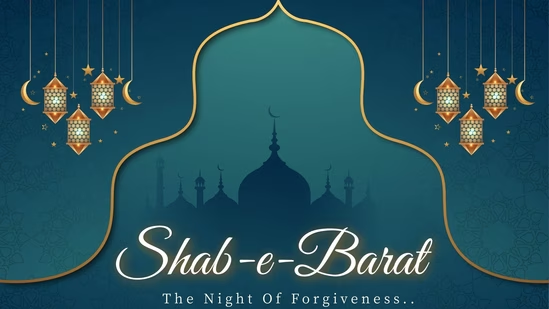Shab-e-Barat, also known as the “Night of Forgiveness,” is one of the most significant and spiritually rewarding nights for Muslims around the world. It falls on the 14th night of Sha’ban, the eighth month of the Islamic lunar calendar, and is considered a time for Muslims to seek forgiveness, pray for mercy, and reflect on their deeds. The date of Shab-e-Barat is subject to moon sighting, which can lead to differences in when the observance is marked across various countries. As we approach 2025, the question arises: when will Shab-e-Barat be observed in 2025 — February 13 or 14?
The Significance of Shab-e-Barat
Shab-e-Barat, which translates to “The Night of Records” or “Night of Forgiveness,” is deeply revered by Muslims for its spiritual importance. On this night, Muslims believe that Allah (God) forgives the sins of the faithful and grants them the opportunity to seek redemption. It is also believed to be the night when Allah determines the fate of individuals for the coming year, including matters of life, death, sustenance, and health. This makes the night a time of intense prayer, self-reflection, and seeking forgiveness.
During Shab-e-Barat, many Muslims engage in activities such as reciting Quranic verses, offering additional prayers, making supplications, and asking for forgiveness for their sins. Some also visit the graves of their loved ones to pray for their souls. The night is seen as an opportunity to purify oneself spiritually and ask for Allah’s mercy and blessings.

When Is Shab-e-Barat in 2025?
Since the Islamic calendar is based on the lunar cycle, the exact date of Shab-e-Barat can vary from year to year. The beginning of each month in the Islamic calendar is determined by the sighting of the moon, which can differ depending on geographical location. This variability often leads to differences in the observance of Islamic holidays and special nights like Shab-e-Barat.
For the year 2025, Shab-e-Barat is expected to fall on the night of February 13, with the 14th of Sha’ban being on February 14. However, since the Islamic months do not start at the same time worldwide, some regions may observe Shab-e-Barat a day earlier or later depending on when the moon is sighted. This is why some countries or regions may observe the night of forgiveness on February 14, while others might observe it on February 13.


Factors Influencing the Date of Shab-e-Barat
- Moon Sighting: As mentioned earlier, the exact date of Shab-e-Barat depends on the sighting of the moon. The Islamic calendar follows a lunar system, meaning months can be either 29 or 30 days long. The 14th of Sha’ban, which marks Shab-e-Barat, is determined once the moon is sighted, and this process can vary depending on local moon sightings.
- Geographical Location: Different countries or even different regions within a country may have variations in moon sighting. As a result, Shab-e-Barat may be celebrated on different dates across the world. In countries with large Muslim populations, such as India, Pakistan, and Bangladesh, local moon sightings often determine the exact date. Similarly, in the Middle East and parts of Southeast Asia, communities follow their own moon sighting practices.
- Time Zone Differences: The time zone differences across the world also influence the observance of Shab-e-Barat. While the night of February 13 may begin in some regions in the evening of February 13, others may begin their observance on the evening of February 14 due to time zone differences.
How Do Different Countries Observe Shab-e-Barat?
The observance of Shab-e-Barat is culturally significant across different Muslim communities, with some variations in practices from country to country. While the spiritual focus remains the same, here are some common traditions observed during the night:
- Prayer and Worship: Muslims offer additional prayers (Nafl prayers) and recite special supplications on this night. Many believe that their prayers on this night are answered by Allah, and it is an ideal time for personal reflection and spiritual renewal.
- Visiting Graves: A common tradition for many is visiting the graves of deceased family members. Muslims believe that during Shab-e-Barat, the souls of the deceased are particularly near and that prayers for their souls on this night are especially beneficial.
- Charity and Fasting: Some Muslims observe voluntary fasting during the day leading up to Shab-e-Barat, while others engage in acts of charity, distributing food, money, or other forms of assistance to those in need.
- Community Gatherings: In many countries, Shab-e-Barat is a time for community prayers and gatherings. Mosques often hold special prayers and lectures, and some Muslims host gatherings at home where they engage in prayer and remembrance together.
The Differences in Dates and Local Customs
Although the date of Shab-e-Barat is expected to fall around February 13 and 14, some countries may observe the night on different dates based on their local moon sighting methods. In countries like Saudi Arabia and the UAE, the official moon sighting announcement plays a central role in determining the exact date. On the other hand, countries such as India and Pakistan may have regional variations in the observance.
Conclusion
In conclusion, Shab-e-Barat in 2025 will likely be observed on the night of February 13, with the 14th of Sha’ban falling on February 14. However, due to moon sighting practices, some countries or regions may mark the event a day earlier or later. Regardless of the exact date, Shab-e-Barat remains an important occasion for Muslims to seek forgiveness, reflect on their lives, and pray for mercy and blessings for themselves, their loved ones, and their communities. It is a time of spiritual renewal and deep connection with Allah, setting the tone for the coming year.
Do follow Uae stories for more Updates
Audi and Al Nabooda Celebrate Successful Sweeney Todd Collaboration at Dubai Opera












